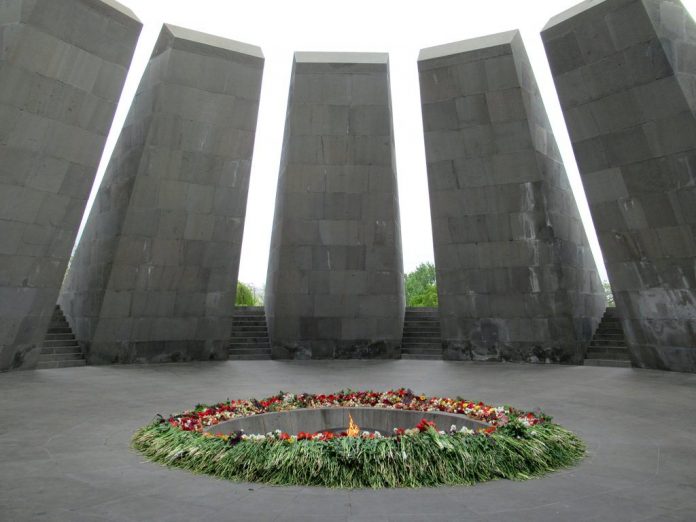‘History does not repeat itself. It rhymes’, they say. It cannot be more true when it comes to Turkish history. When one starts reading the recent history, you cannot escape but have a strong conviction that it rhymes for the last 150 years. Different experiences of suffering are the rhymes of this history. Starting with the Armenians, continuing with the Assyrians, Kurds, Alawis, Greeks, and Jews and now with the Gülenists. They all suffered but none’s amounted to what the Armenians had lived through.
When it so often rhymes, the natural question is why?
Footage on Turkish TVs shows Turkish President Recep Tayyip Erdoğan exiting a luxury residence complex in Istanbul with his escorts and bodyguards. He is in his car, choses to stop his convoy and chat with the locals. He is speaking to a woman whom the watchers cannot see. She is very excited and strongly requests from the President to confiscate the houses of the suspected Gülenists in the housing complex. ‘Please, Mr. President! Confiscate their houses. Their houses are still here. We do not want them’. Happy with the reaction, a self-confident Erdoğan says he will look into it. The ‘neighbors’ of the woman who are accused of being Gülenists are already in prison or fled leaving everything they had in their own country. But the neighbors are not satisfied, they want more. Their traces should be eradicated.
In the wake of the failed coup attempt of July the 15th, government has confiscated not only the companies but also the private properties of thousands of businessmen allegedly having links with the Gülen movement. According to the official SDIF (Savings Deposit Insurance Fund) figures, the amount transferred first to the state then to the AKP’s cronies now amounts to at least 11.32 billion USD.
The largest transfer of fortune took place when the Armenians were condemned to forced march to Syrian deserts leaving behind everything they had. The capital collected first from the Armenians then from the Greeks and the Jews was used to create the national bourgeoisie of the young Turkish Republic.
In another TV footage, a man is seen with two small babies. Their mother has come to the local police station to be questioned on the allegations of being a member of the Gülen movement. To the shock of many, she is arrested leaving behind two babies in the urgent need of their mothers’ breastfeeding. The startled man who is a relative says he does not know what to do with the babies.
The Stockholm Center for Freedom (SCF) created by the exiled Turkish journalists put the number of jailed women between 16.000 and 20.000 in Turkish prisons after the botched coup. SCF has also announced that there are currently more than 700 children in prisons with their mothers.
Islamic thinker Said Nursi who founded the Nurcu movement talks about his experience with the Armenian children in his memoirs of the World War I and says he himself sheltered ‘thousands of Armenian children’ whose parents had vanished.
Turks worship their state and take pride by the fact that they created so many states throughout history. Worship brings total obedience and obedience makes one believe in whatever the authority keeps telling you.
Whether it is the Armenian genocide, the massacre of Alawis at Dersim or recently the liquidation of the Gülen movement a.k.a. Hizmet, one should admit Turkish state has been extremely successful in telling fabricated stories.
That is why controlling the media has been an obsession for most of the Turkish governments. Narratives challenging the official one should be suffocated. It is no surprise that Erdoğan has been waging such a reckless war against the critical media and making Turkey the champion of journalist-jailer even ahead of China. More than 100.000 websites are banned.
The monopoly of information enables those in the government to sell all but their version of the story. Armenians were exiled because they were siding with the invading Russian armies but it never bothers to explain how 2/3 of the Ottomans Armenians disappeared when they were travelling to Syrian deserts. Alewis were punished because they revolted against the state; Kurds faced a similar fate because they were also rebellious. Lately, Gülenists should be punished en mass as they all were behind the coup attempt.
In all these examples, there is a collective punishment -the worst befalling on the Armenians, which is incomparable to the others- and the state banalizes every single misery. Banalization leads to the astonishing indifference of the people. Buying the story told by their state, Turks, with very few exceptions, never asked the questions why so many Armenians perished if they were simply banished, what happened to their kids and who owned the properties of the Armenians that were left behind. There was never questioning let alone a meaningful soul-searching.
Coming to the question I raised in the beginning as to why the Turkish history rhymes so much, the initial answer might be the lack of proper naming that prevents people to understand the sheer gravity and the magnitude of others’ suffering. I have been a reporter for almost 23 years. I do not remember one instance in which I would refer to the Armenian genocide without quotation marks or the expression ‘so-called’ preceding it. This is the first article I use the word genocide without any qualifications. That, now, seems to me the first step to grasp the true nature of the suffering Armenians went through. And I apologize on behalf on no one but myself.

